Contemporary Hospitality Industry Report - Hospitality, Semester 1
VerifiedAdded on 2020/12/09
|12
|3480
|159
Report
AI Summary
This report provides a comprehensive analysis of the contemporary hospitality industry, focusing on the UK market. It begins by examining the scale, scope, and diversity of the industry, including its economic impact, various ownership models, and the range of products and services offered. The report then delves into the organizational structures of hospitality businesses, differentiating between functional, divisional, and flat structures, with examples from five-star hotels, catering services, and theme parks. Furthermore, it assesses the roles of various hospitality-related organizations and professional bodies, such as People 1st and the British Hospitality Association. The report also explores staffing requirements, including roles, responsibilities, and qualification needs for different positions. It discusses operational, managerial, and legislative issues, including retention of key skill sets. Finally, the report touches on the current image of the hospitality industry and predicts potential trends and developments, analyzing their impact on the sector. The chosen major operator, Intercontinental Hotel Groups (IHG), is also discussed in detail.
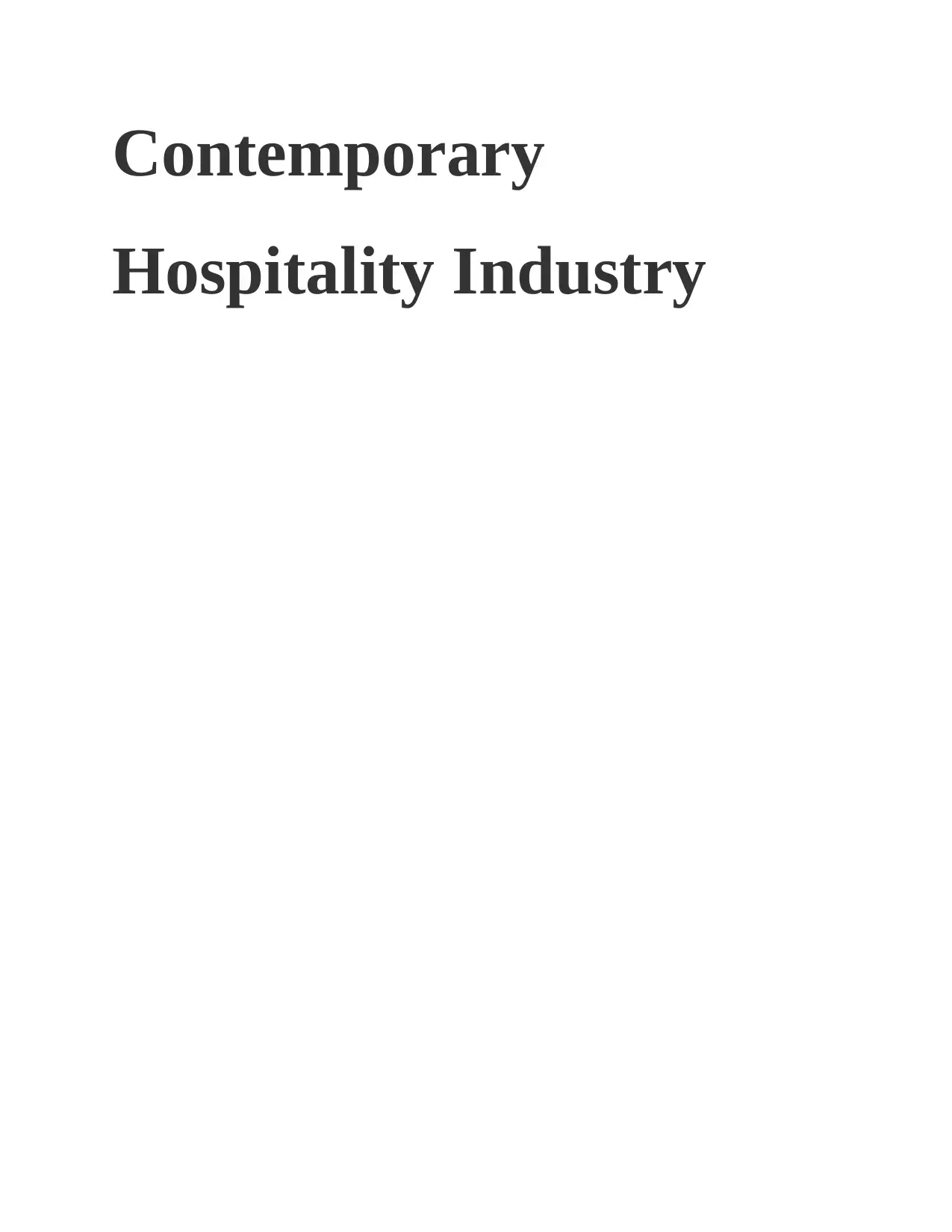
Contemporary
Hospitality Industry
Hospitality Industry
Paraphrase This Document
Need a fresh take? Get an instant paraphrase of this document with our AI Paraphraser
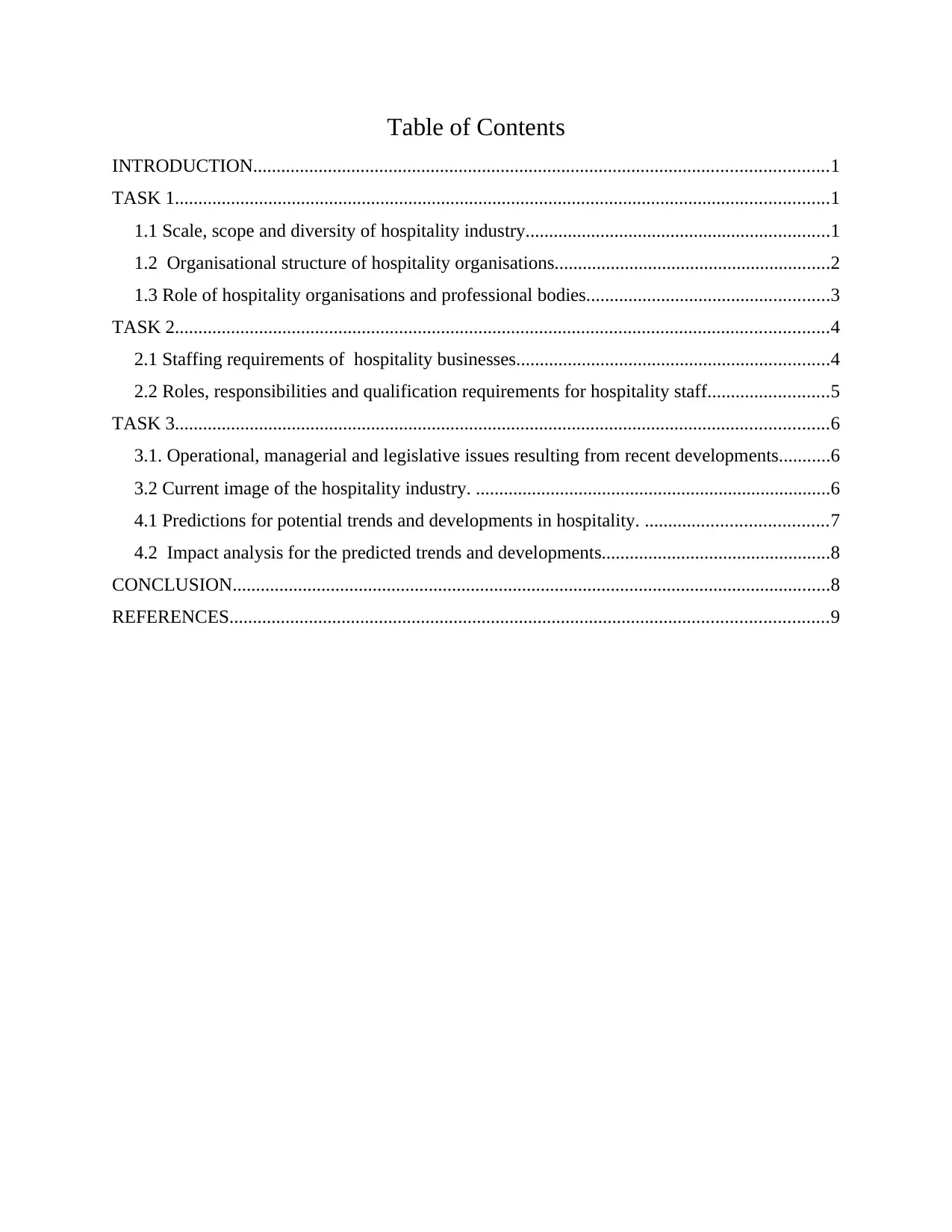
Table of Contents
INTRODUCTION...........................................................................................................................1
TASK 1............................................................................................................................................1
1.1 Scale, scope and diversity of hospitality industry.................................................................1
1.2 Organisational structure of hospitality organisations...........................................................2
1.3 Role of hospitality organisations and professional bodies....................................................3
TASK 2............................................................................................................................................4
2.1 Staffing requirements of hospitality businesses...................................................................4
2.2 Roles, responsibilities and qualification requirements for hospitality staff..........................5
TASK 3............................................................................................................................................6
3.1. Operational, managerial and legislative issues resulting from recent developments...........6
3.2 Current image of the hospitality industry. ............................................................................6
4.1 Predictions for potential trends and developments in hospitality. .......................................7
4.2 Impact analysis for the predicted trends and developments.................................................8
CONCLUSION................................................................................................................................8
REFERENCES................................................................................................................................9
INTRODUCTION...........................................................................................................................1
TASK 1............................................................................................................................................1
1.1 Scale, scope and diversity of hospitality industry.................................................................1
1.2 Organisational structure of hospitality organisations...........................................................2
1.3 Role of hospitality organisations and professional bodies....................................................3
TASK 2............................................................................................................................................4
2.1 Staffing requirements of hospitality businesses...................................................................4
2.2 Roles, responsibilities and qualification requirements for hospitality staff..........................5
TASK 3............................................................................................................................................6
3.1. Operational, managerial and legislative issues resulting from recent developments...........6
3.2 Current image of the hospitality industry. ............................................................................6
4.1 Predictions for potential trends and developments in hospitality. .......................................7
4.2 Impact analysis for the predicted trends and developments.................................................8
CONCLUSION................................................................................................................................8
REFERENCES................................................................................................................................9
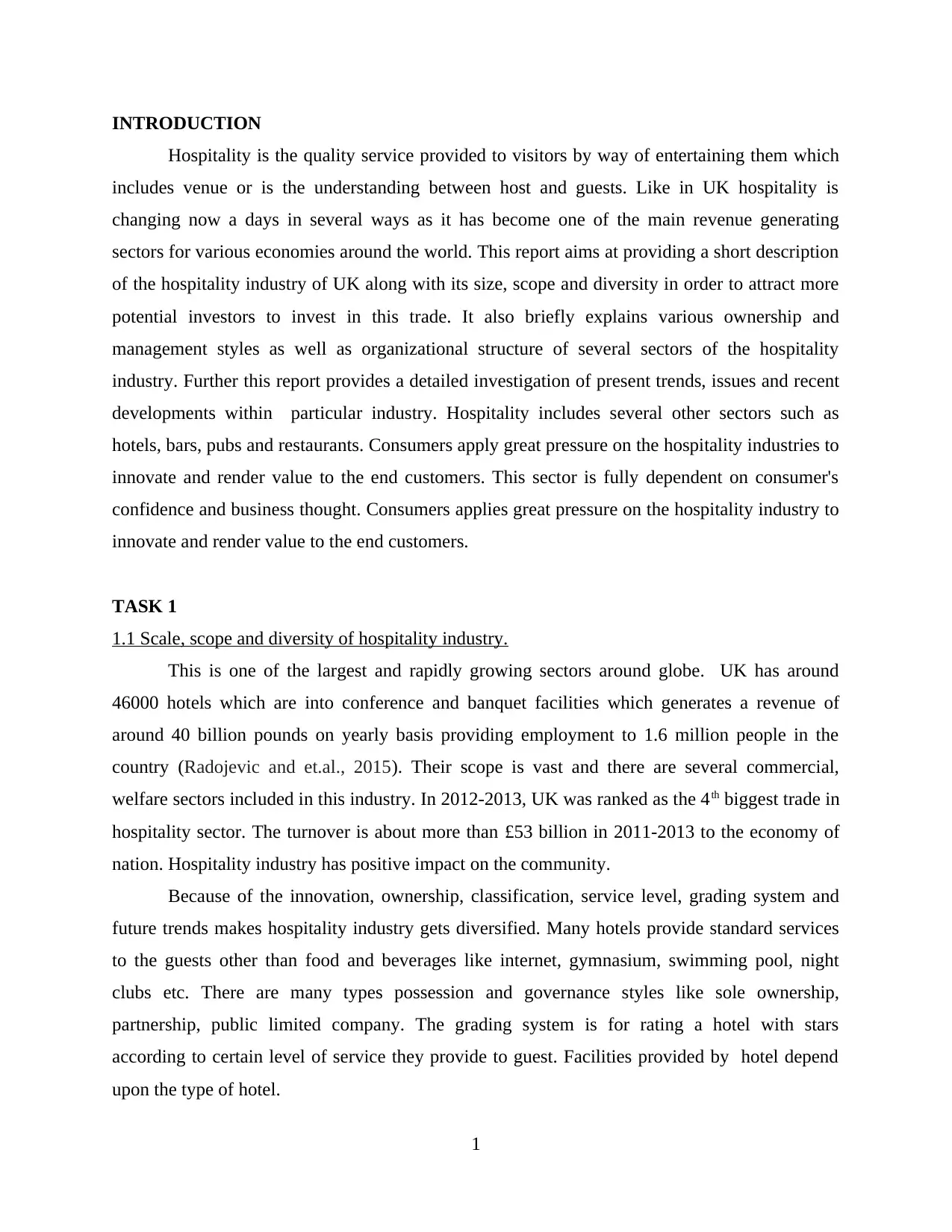
INTRODUCTION
Hospitality is the quality service provided to visitors by way of entertaining them which
includes venue or is the understanding between host and guests. Like in UK hospitality is
changing now a days in several ways as it has become one of the main revenue generating
sectors for various economies around the world. This report aims at providing a short description
of the hospitality industry of UK along with its size, scope and diversity in order to attract more
potential investors to invest in this trade. It also briefly explains various ownership and
management styles as well as organizational structure of several sectors of the hospitality
industry. Further this report provides a detailed investigation of present trends, issues and recent
developments within particular industry. Hospitality includes several other sectors such as
hotels, bars, pubs and restaurants. Consumers apply great pressure on the hospitality industries to
innovate and render value to the end customers. This sector is fully dependent on consumer's
confidence and business thought. Consumers applies great pressure on the hospitality industry to
innovate and render value to the end customers.
TASK 1
1.1 Scale, scope and diversity of hospitality industry.
This is one of the largest and rapidly growing sectors around globe. UK has around
46000 hotels which are into conference and banquet facilities which generates a revenue of
around 40 billion pounds on yearly basis providing employment to 1.6 million people in the
country (Radojevic and et.al., 2015). Their scope is vast and there are several commercial,
welfare sectors included in this industry. In 2012-2013, UK was ranked as the 4th biggest trade in
hospitality sector. The turnover is about more than £53 billion in 2011-2013 to the economy of
nation. Hospitality industry has positive impact on the community.
Because of the innovation, ownership, classification, service level, grading system and
future trends makes hospitality industry gets diversified. Many hotels provide standard services
to the guests other than food and beverages like internet, gymnasium, swimming pool, night
clubs etc. There are many types possession and governance styles like sole ownership,
partnership, public limited company. The grading system is for rating a hotel with stars
according to certain level of service they provide to guest. Facilities provided by hotel depend
upon the type of hotel.
1
Hospitality is the quality service provided to visitors by way of entertaining them which
includes venue or is the understanding between host and guests. Like in UK hospitality is
changing now a days in several ways as it has become one of the main revenue generating
sectors for various economies around the world. This report aims at providing a short description
of the hospitality industry of UK along with its size, scope and diversity in order to attract more
potential investors to invest in this trade. It also briefly explains various ownership and
management styles as well as organizational structure of several sectors of the hospitality
industry. Further this report provides a detailed investigation of present trends, issues and recent
developments within particular industry. Hospitality includes several other sectors such as
hotels, bars, pubs and restaurants. Consumers apply great pressure on the hospitality industries to
innovate and render value to the end customers. This sector is fully dependent on consumer's
confidence and business thought. Consumers applies great pressure on the hospitality industry to
innovate and render value to the end customers.
TASK 1
1.1 Scale, scope and diversity of hospitality industry.
This is one of the largest and rapidly growing sectors around globe. UK has around
46000 hotels which are into conference and banquet facilities which generates a revenue of
around 40 billion pounds on yearly basis providing employment to 1.6 million people in the
country (Radojevic and et.al., 2015). Their scope is vast and there are several commercial,
welfare sectors included in this industry. In 2012-2013, UK was ranked as the 4th biggest trade in
hospitality sector. The turnover is about more than £53 billion in 2011-2013 to the economy of
nation. Hospitality industry has positive impact on the community.
Because of the innovation, ownership, classification, service level, grading system and
future trends makes hospitality industry gets diversified. Many hotels provide standard services
to the guests other than food and beverages like internet, gymnasium, swimming pool, night
clubs etc. There are many types possession and governance styles like sole ownership,
partnership, public limited company. The grading system is for rating a hotel with stars
according to certain level of service they provide to guest. Facilities provided by hotel depend
upon the type of hotel.
1
⊘ This is a preview!⊘
Do you want full access?
Subscribe today to unlock all pages.

Trusted by 1+ million students worldwide
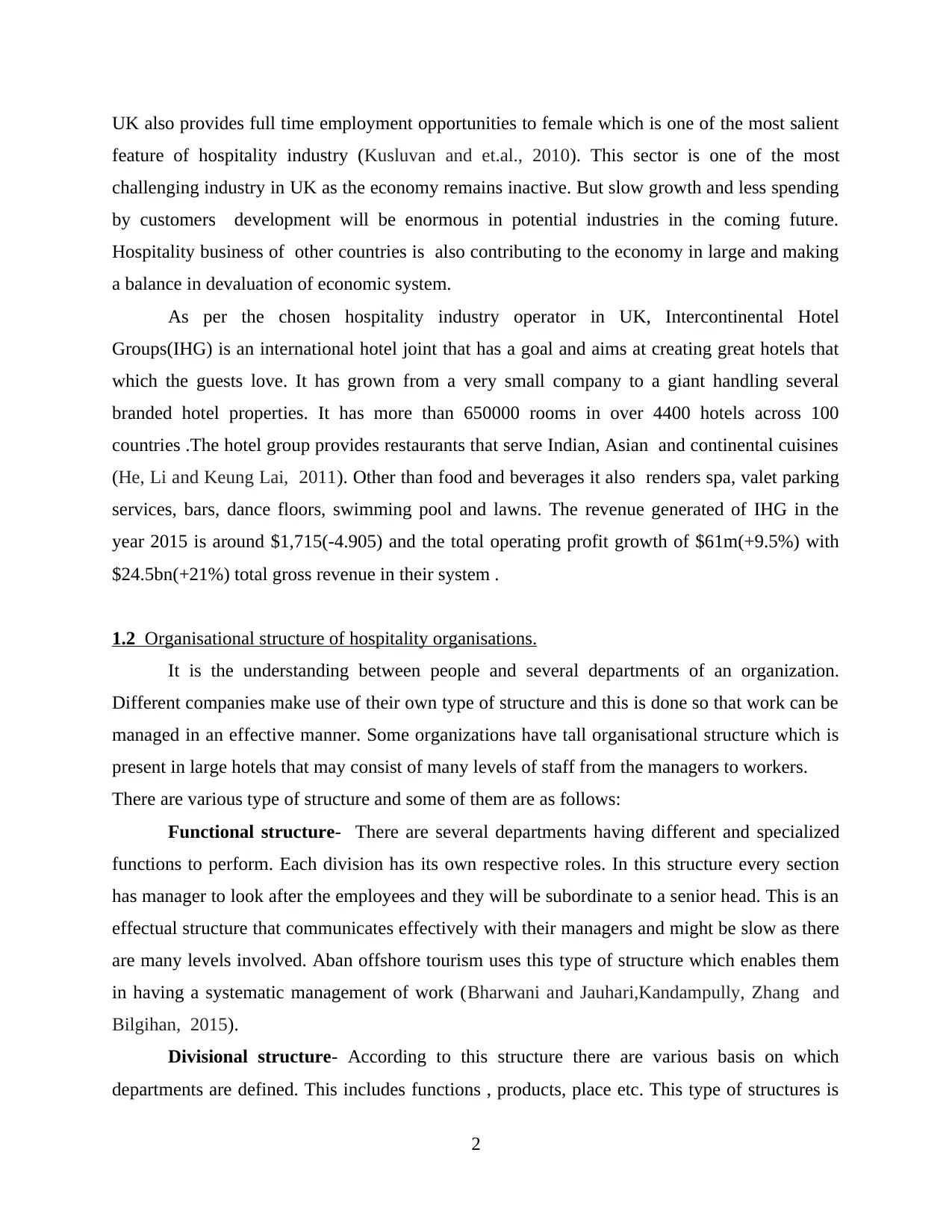
UK also provides full time employment opportunities to female which is one of the most salient
feature of hospitality industry (Kusluvan and et.al., 2010). This sector is one of the most
challenging industry in UK as the economy remains inactive. But slow growth and less spending
by customers development will be enormous in potential industries in the coming future.
Hospitality business of other countries is also contributing to the economy in large and making
a balance in devaluation of economic system.
As per the chosen hospitality industry operator in UK, Intercontinental Hotel
Groups(IHG) is an international hotel joint that has a goal and aims at creating great hotels that
which the guests love. It has grown from a very small company to a giant handling several
branded hotel properties. It has more than 650000 rooms in over 4400 hotels across 100
countries .The hotel group provides restaurants that serve Indian, Asian and continental cuisines
(He, Li and Keung Lai, 2011). Other than food and beverages it also renders spa, valet parking
services, bars, dance floors, swimming pool and lawns. The revenue generated of IHG in the
year 2015 is around $1,715(-4.905) and the total operating profit growth of $61m(+9.5%) with
$24.5bn(+21%) total gross revenue in their system .
1.2 Organisational structure of hospitality organisations.
It is the understanding between people and several departments of an organization.
Different companies make use of their own type of structure and this is done so that work can be
managed in an effective manner. Some organizations have tall organisational structure which is
present in large hotels that may consist of many levels of staff from the managers to workers.
There are various type of structure and some of them are as follows:
Functional structure- There are several departments having different and specialized
functions to perform. Each division has its own respective roles. In this structure every section
has manager to look after the employees and they will be subordinate to a senior head. This is an
effectual structure that communicates effectively with their managers and might be slow as there
are many levels involved. Aban offshore tourism uses this type of structure which enables them
in having a systematic management of work (Bharwani and Jauhari,Kandampully, Zhang and
Bilgihan, 2015).
Divisional structure- According to this structure there are various basis on which
departments are defined. This includes functions , products, place etc. This type of structures is
2
feature of hospitality industry (Kusluvan and et.al., 2010). This sector is one of the most
challenging industry in UK as the economy remains inactive. But slow growth and less spending
by customers development will be enormous in potential industries in the coming future.
Hospitality business of other countries is also contributing to the economy in large and making
a balance in devaluation of economic system.
As per the chosen hospitality industry operator in UK, Intercontinental Hotel
Groups(IHG) is an international hotel joint that has a goal and aims at creating great hotels that
which the guests love. It has grown from a very small company to a giant handling several
branded hotel properties. It has more than 650000 rooms in over 4400 hotels across 100
countries .The hotel group provides restaurants that serve Indian, Asian and continental cuisines
(He, Li and Keung Lai, 2011). Other than food and beverages it also renders spa, valet parking
services, bars, dance floors, swimming pool and lawns. The revenue generated of IHG in the
year 2015 is around $1,715(-4.905) and the total operating profit growth of $61m(+9.5%) with
$24.5bn(+21%) total gross revenue in their system .
1.2 Organisational structure of hospitality organisations.
It is the understanding between people and several departments of an organization.
Different companies make use of their own type of structure and this is done so that work can be
managed in an effective manner. Some organizations have tall organisational structure which is
present in large hotels that may consist of many levels of staff from the managers to workers.
There are various type of structure and some of them are as follows:
Functional structure- There are several departments having different and specialized
functions to perform. Each division has its own respective roles. In this structure every section
has manager to look after the employees and they will be subordinate to a senior head. This is an
effectual structure that communicates effectively with their managers and might be slow as there
are many levels involved. Aban offshore tourism uses this type of structure which enables them
in having a systematic management of work (Bharwani and Jauhari,Kandampully, Zhang and
Bilgihan, 2015).
Divisional structure- According to this structure there are various basis on which
departments are defined. This includes functions , products, place etc. This type of structures is
2
Paraphrase This Document
Need a fresh take? Get an instant paraphrase of this document with our AI Paraphraser
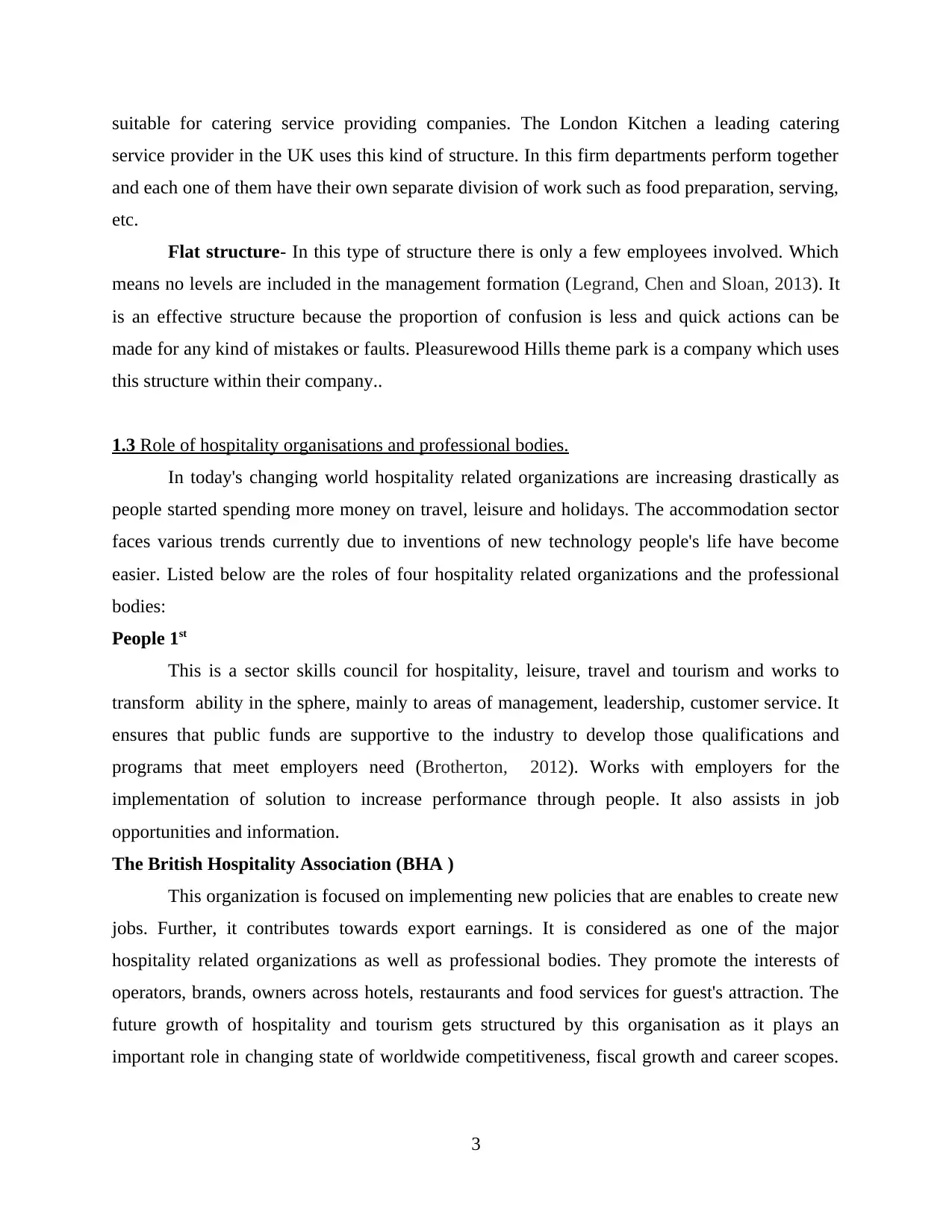
suitable for catering service providing companies. The London Kitchen a leading catering
service provider in the UK uses this kind of structure. In this firm departments perform together
and each one of them have their own separate division of work such as food preparation, serving,
etc.
Flat structure- In this type of structure there is only a few employees involved. Which
means no levels are included in the management formation (Legrand, Chen and Sloan, 2013). It
is an effective structure because the proportion of confusion is less and quick actions can be
made for any kind of mistakes or faults. Pleasurewood Hills theme park is a company which uses
this structure within their company..
1.3 Role of hospitality organisations and professional bodies.
In today's changing world hospitality related organizations are increasing drastically as
people started spending more money on travel, leisure and holidays. The accommodation sector
faces various trends currently due to inventions of new technology people's life have become
easier. Listed below are the roles of four hospitality related organizations and the professional
bodies:
People 1st
This is a sector skills council for hospitality, leisure, travel and tourism and works to
transform ability in the sphere, mainly to areas of management, leadership, customer service. It
ensures that public funds are supportive to the industry to develop those qualifications and
programs that meet employers need (Brotherton, 2012). Works with employers for the
implementation of solution to increase performance through people. It also assists in job
opportunities and information.
The British Hospitality Association (BHA )
This organization is focused on implementing new policies that are enables to create new
jobs. Further, it contributes towards export earnings. It is considered as one of the major
hospitality related organizations as well as professional bodies. They promote the interests of
operators, brands, owners across hotels, restaurants and food services for guest's attraction. The
future growth of hospitality and tourism gets structured by this organisation as it plays an
important role in changing state of worldwide competitiveness, fiscal growth and career scopes.
3
service provider in the UK uses this kind of structure. In this firm departments perform together
and each one of them have their own separate division of work such as food preparation, serving,
etc.
Flat structure- In this type of structure there is only a few employees involved. Which
means no levels are included in the management formation (Legrand, Chen and Sloan, 2013). It
is an effective structure because the proportion of confusion is less and quick actions can be
made for any kind of mistakes or faults. Pleasurewood Hills theme park is a company which uses
this structure within their company..
1.3 Role of hospitality organisations and professional bodies.
In today's changing world hospitality related organizations are increasing drastically as
people started spending more money on travel, leisure and holidays. The accommodation sector
faces various trends currently due to inventions of new technology people's life have become
easier. Listed below are the roles of four hospitality related organizations and the professional
bodies:
People 1st
This is a sector skills council for hospitality, leisure, travel and tourism and works to
transform ability in the sphere, mainly to areas of management, leadership, customer service. It
ensures that public funds are supportive to the industry to develop those qualifications and
programs that meet employers need (Brotherton, 2012). Works with employers for the
implementation of solution to increase performance through people. It also assists in job
opportunities and information.
The British Hospitality Association (BHA )
This organization is focused on implementing new policies that are enables to create new
jobs. Further, it contributes towards export earnings. It is considered as one of the major
hospitality related organizations as well as professional bodies. They promote the interests of
operators, brands, owners across hotels, restaurants and food services for guest's attraction. The
future growth of hospitality and tourism gets structured by this organisation as it plays an
important role in changing state of worldwide competitiveness, fiscal growth and career scopes.
3
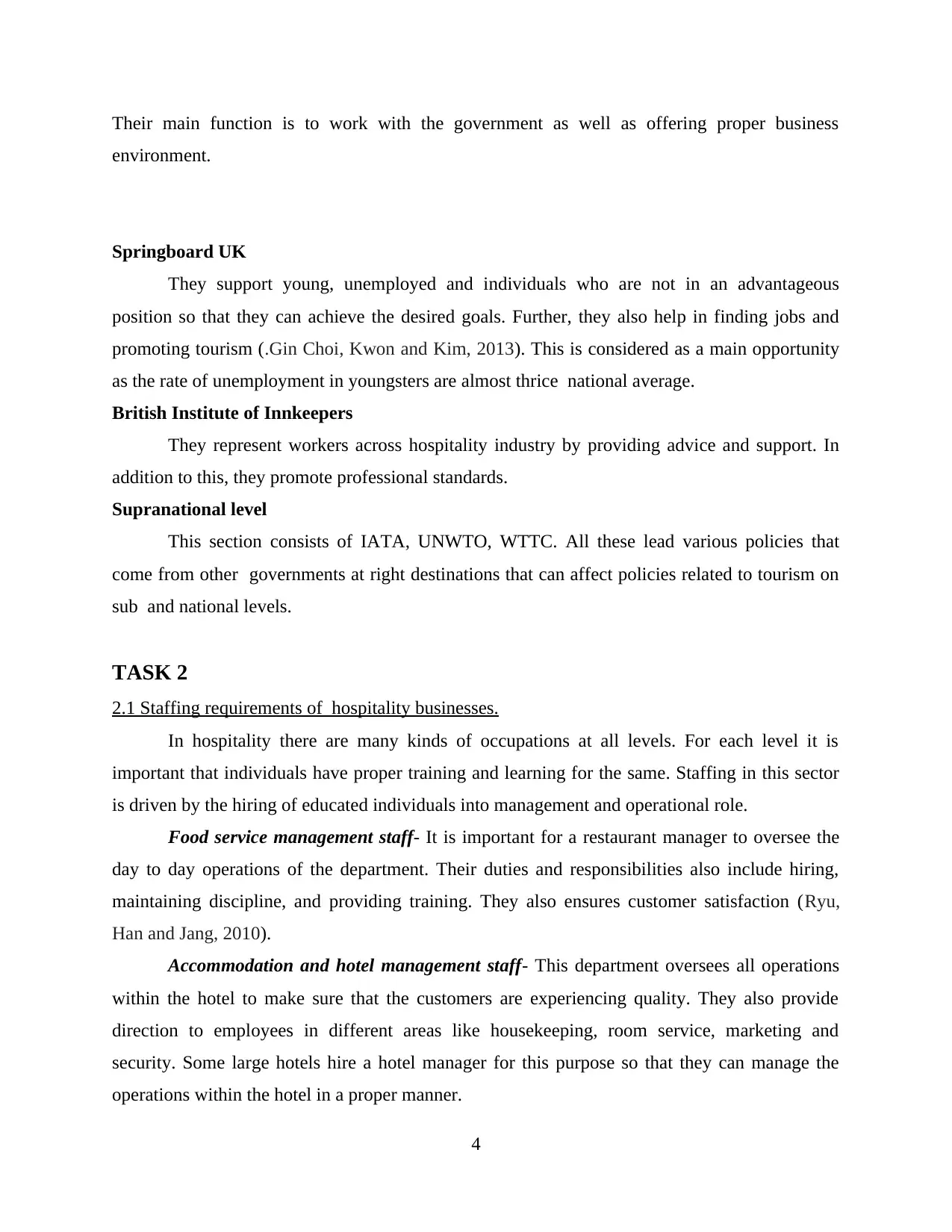
Their main function is to work with the government as well as offering proper business
environment.
Springboard UK
They support young, unemployed and individuals who are not in an advantageous
position so that they can achieve the desired goals. Further, they also help in finding jobs and
promoting tourism (.Gin Choi, Kwon and Kim, 2013). This is considered as a main opportunity
as the rate of unemployment in youngsters are almost thrice national average.
British Institute of Innkeepers
They represent workers across hospitality industry by providing advice and support. In
addition to this, they promote professional standards.
Supranational level
This section consists of IATA, UNWTO, WTTC. All these lead various policies that
come from other governments at right destinations that can affect policies related to tourism on
sub and national levels.
TASK 2
2.1 Staffing requirements of hospitality businesses.
In hospitality there are many kinds of occupations at all levels. For each level it is
important that individuals have proper training and learning for the same. Staffing in this sector
is driven by the hiring of educated individuals into management and operational role.
Food service management staff- It is important for a restaurant manager to oversee the
day to day operations of the department. Their duties and responsibilities also include hiring,
maintaining discipline, and providing training. They also ensures customer satisfaction (Ryu,
Han and Jang, 2010).
Accommodation and hotel management staff- This department oversees all operations
within the hotel to make sure that the customers are experiencing quality. They also provide
direction to employees in different areas like housekeeping, room service, marketing and
security. Some large hotels hire a hotel manager for this purpose so that they can manage the
operations within the hotel in a proper manner.
4
environment.
Springboard UK
They support young, unemployed and individuals who are not in an advantageous
position so that they can achieve the desired goals. Further, they also help in finding jobs and
promoting tourism (.Gin Choi, Kwon and Kim, 2013). This is considered as a main opportunity
as the rate of unemployment in youngsters are almost thrice national average.
British Institute of Innkeepers
They represent workers across hospitality industry by providing advice and support. In
addition to this, they promote professional standards.
Supranational level
This section consists of IATA, UNWTO, WTTC. All these lead various policies that
come from other governments at right destinations that can affect policies related to tourism on
sub and national levels.
TASK 2
2.1 Staffing requirements of hospitality businesses.
In hospitality there are many kinds of occupations at all levels. For each level it is
important that individuals have proper training and learning for the same. Staffing in this sector
is driven by the hiring of educated individuals into management and operational role.
Food service management staff- It is important for a restaurant manager to oversee the
day to day operations of the department. Their duties and responsibilities also include hiring,
maintaining discipline, and providing training. They also ensures customer satisfaction (Ryu,
Han and Jang, 2010).
Accommodation and hotel management staff- This department oversees all operations
within the hotel to make sure that the customers are experiencing quality. They also provide
direction to employees in different areas like housekeeping, room service, marketing and
security. Some large hotels hire a hotel manager for this purpose so that they can manage the
operations within the hotel in a proper manner.
4
⊘ This is a preview!⊘
Do you want full access?
Subscribe today to unlock all pages.

Trusted by 1+ million students worldwide
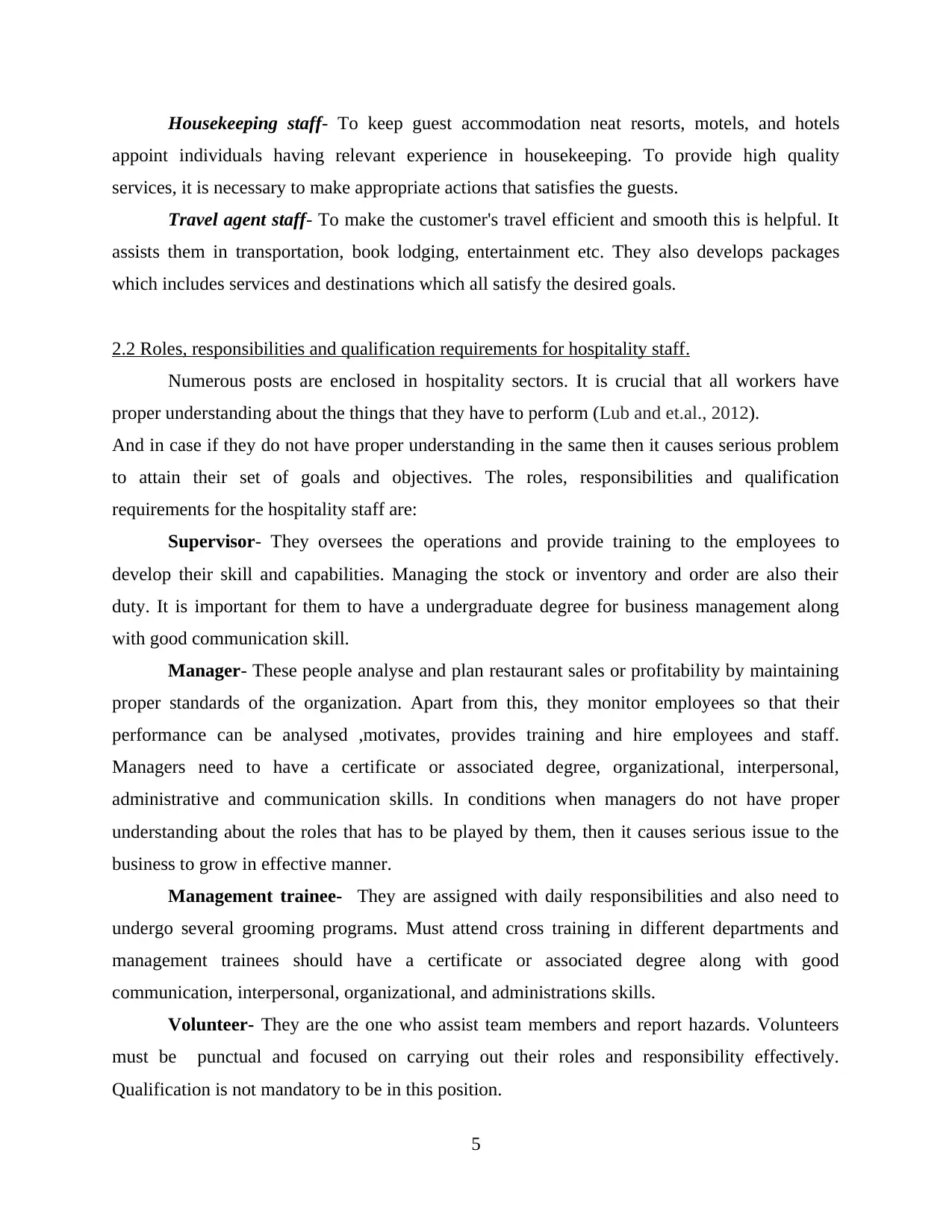
Housekeeping staff- To keep guest accommodation neat resorts, motels, and hotels
appoint individuals having relevant experience in housekeeping. To provide high quality
services, it is necessary to make appropriate actions that satisfies the guests.
Travel agent staff- To make the customer's travel efficient and smooth this is helpful. It
assists them in transportation, book lodging, entertainment etc. They also develops packages
which includes services and destinations which all satisfy the desired goals.
2.2 Roles, responsibilities and qualification requirements for hospitality staff.
Numerous posts are enclosed in hospitality sectors. It is crucial that all workers have
proper understanding about the things that they have to perform (Lub and et.al., 2012).
And in case if they do not have proper understanding in the same then it causes serious problem
to attain their set of goals and objectives. The roles, responsibilities and qualification
requirements for the hospitality staff are:
Supervisor- They oversees the operations and provide training to the employees to
develop their skill and capabilities. Managing the stock or inventory and order are also their
duty. It is important for them to have a undergraduate degree for business management along
with good communication skill.
Manager- These people analyse and plan restaurant sales or profitability by maintaining
proper standards of the organization. Apart from this, they monitor employees so that their
performance can be analysed ,motivates, provides training and hire employees and staff.
Managers need to have a certificate or associated degree, organizational, interpersonal,
administrative and communication skills. In conditions when managers do not have proper
understanding about the roles that has to be played by them, then it causes serious issue to the
business to grow in effective manner.
Management trainee- They are assigned with daily responsibilities and also need to
undergo several grooming programs. Must attend cross training in different departments and
management trainees should have a certificate or associated degree along with good
communication, interpersonal, organizational, and administrations skills.
Volunteer- They are the one who assist team members and report hazards. Volunteers
must be punctual and focused on carrying out their roles and responsibility effectively.
Qualification is not mandatory to be in this position.
5
appoint individuals having relevant experience in housekeeping. To provide high quality
services, it is necessary to make appropriate actions that satisfies the guests.
Travel agent staff- To make the customer's travel efficient and smooth this is helpful. It
assists them in transportation, book lodging, entertainment etc. They also develops packages
which includes services and destinations which all satisfy the desired goals.
2.2 Roles, responsibilities and qualification requirements for hospitality staff.
Numerous posts are enclosed in hospitality sectors. It is crucial that all workers have
proper understanding about the things that they have to perform (Lub and et.al., 2012).
And in case if they do not have proper understanding in the same then it causes serious problem
to attain their set of goals and objectives. The roles, responsibilities and qualification
requirements for the hospitality staff are:
Supervisor- They oversees the operations and provide training to the employees to
develop their skill and capabilities. Managing the stock or inventory and order are also their
duty. It is important for them to have a undergraduate degree for business management along
with good communication skill.
Manager- These people analyse and plan restaurant sales or profitability by maintaining
proper standards of the organization. Apart from this, they monitor employees so that their
performance can be analysed ,motivates, provides training and hire employees and staff.
Managers need to have a certificate or associated degree, organizational, interpersonal,
administrative and communication skills. In conditions when managers do not have proper
understanding about the roles that has to be played by them, then it causes serious issue to the
business to grow in effective manner.
Management trainee- They are assigned with daily responsibilities and also need to
undergo several grooming programs. Must attend cross training in different departments and
management trainees should have a certificate or associated degree along with good
communication, interpersonal, organizational, and administrations skills.
Volunteer- They are the one who assist team members and report hazards. Volunteers
must be punctual and focused on carrying out their roles and responsibility effectively.
Qualification is not mandatory to be in this position.
5
Paraphrase This Document
Need a fresh take? Get an instant paraphrase of this document with our AI Paraphraser
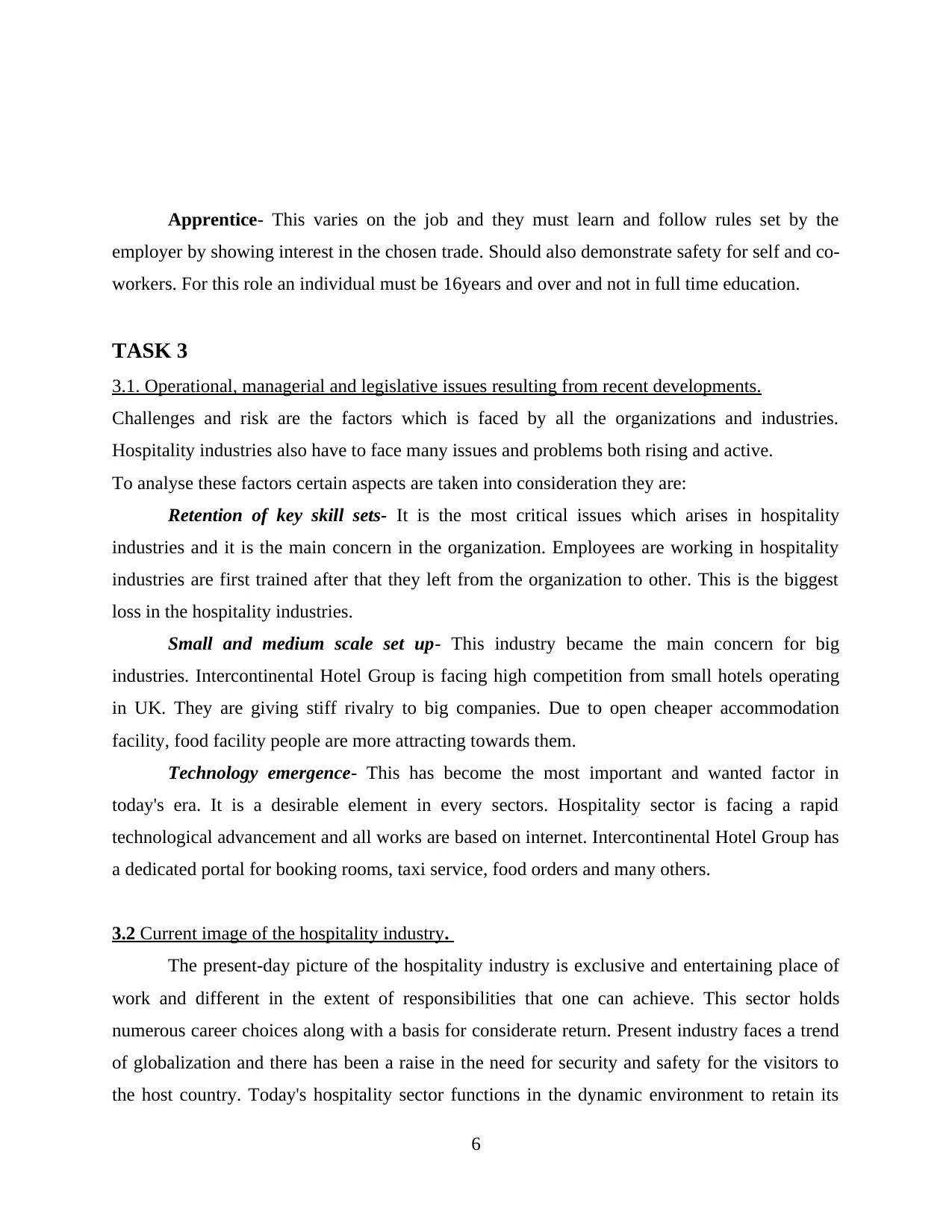
Apprentice- This varies on the job and they must learn and follow rules set by the
employer by showing interest in the chosen trade. Should also demonstrate safety for self and co-
workers. For this role an individual must be 16years and over and not in full time education.
TASK 3
3.1. Operational, managerial and legislative issues resulting from recent developments.
Challenges and risk are the factors which is faced by all the organizations and industries.
Hospitality industries also have to face many issues and problems both rising and active.
To analyse these factors certain aspects are taken into consideration they are:
Retention of key skill sets- It is the most critical issues which arises in hospitality
industries and it is the main concern in the organization. Employees are working in hospitality
industries are first trained after that they left from the organization to other. This is the biggest
loss in the hospitality industries.
Small and medium scale set up- This industry became the main concern for big
industries. Intercontinental Hotel Group is facing high competition from small hotels operating
in UK. They are giving stiff rivalry to big companies. Due to open cheaper accommodation
facility, food facility people are more attracting towards them.
Technology emergence- This has become the most important and wanted factor in
today's era. It is a desirable element in every sectors. Hospitality sector is facing a rapid
technological advancement and all works are based on internet. Intercontinental Hotel Group has
a dedicated portal for booking rooms, taxi service, food orders and many others.
3.2 Current image of the hospitality industry.
The present-day picture of the hospitality industry is exclusive and entertaining place of
work and different in the extent of responsibilities that one can achieve. This sector holds
numerous career choices along with a basis for considerate return. Present industry faces a trend
of globalization and there has been a raise in the need for security and safety for the visitors to
the host country. Today's hospitality sector functions in the dynamic environment to retain its
6
employer by showing interest in the chosen trade. Should also demonstrate safety for self and co-
workers. For this role an individual must be 16years and over and not in full time education.
TASK 3
3.1. Operational, managerial and legislative issues resulting from recent developments.
Challenges and risk are the factors which is faced by all the organizations and industries.
Hospitality industries also have to face many issues and problems both rising and active.
To analyse these factors certain aspects are taken into consideration they are:
Retention of key skill sets- It is the most critical issues which arises in hospitality
industries and it is the main concern in the organization. Employees are working in hospitality
industries are first trained after that they left from the organization to other. This is the biggest
loss in the hospitality industries.
Small and medium scale set up- This industry became the main concern for big
industries. Intercontinental Hotel Group is facing high competition from small hotels operating
in UK. They are giving stiff rivalry to big companies. Due to open cheaper accommodation
facility, food facility people are more attracting towards them.
Technology emergence- This has become the most important and wanted factor in
today's era. It is a desirable element in every sectors. Hospitality sector is facing a rapid
technological advancement and all works are based on internet. Intercontinental Hotel Group has
a dedicated portal for booking rooms, taxi service, food orders and many others.
3.2 Current image of the hospitality industry.
The present-day picture of the hospitality industry is exclusive and entertaining place of
work and different in the extent of responsibilities that one can achieve. This sector holds
numerous career choices along with a basis for considerate return. Present industry faces a trend
of globalization and there has been a raise in the need for security and safety for the visitors to
the host country. Today's hospitality sector functions in the dynamic environment to retain its
6
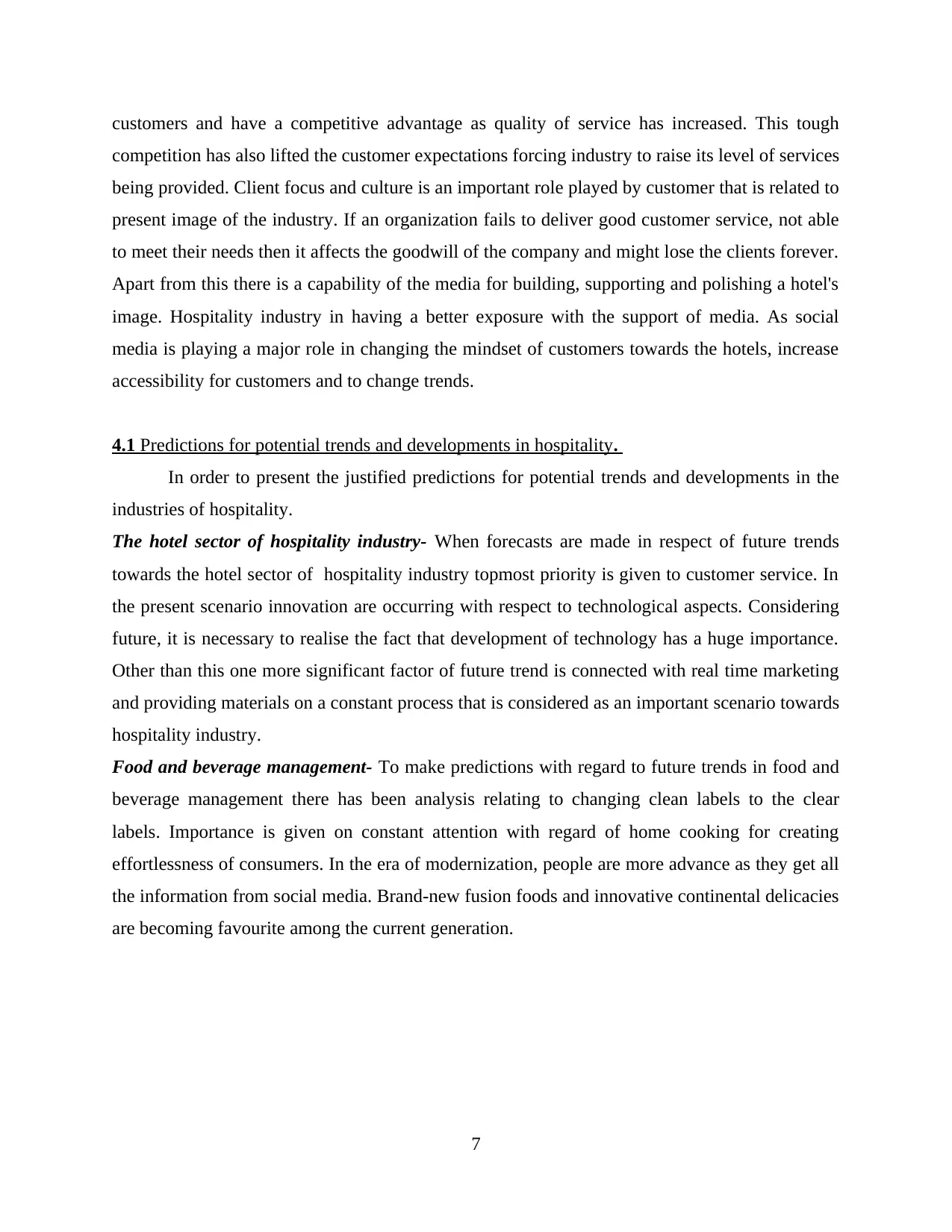
customers and have a competitive advantage as quality of service has increased. This tough
competition has also lifted the customer expectations forcing industry to raise its level of services
being provided. Client focus and culture is an important role played by customer that is related to
present image of the industry. If an organization fails to deliver good customer service, not able
to meet their needs then it affects the goodwill of the company and might lose the clients forever.
Apart from this there is a capability of the media for building, supporting and polishing a hotel's
image. Hospitality industry in having a better exposure with the support of media. As social
media is playing a major role in changing the mindset of customers towards the hotels, increase
accessibility for customers and to change trends.
4.1 Predictions for potential trends and developments in hospitality.
In order to present the justified predictions for potential trends and developments in the
industries of hospitality.
The hotel sector of hospitality industry- When forecasts are made in respect of future trends
towards the hotel sector of hospitality industry topmost priority is given to customer service. In
the present scenario innovation are occurring with respect to technological aspects. Considering
future, it is necessary to realise the fact that development of technology has a huge importance.
Other than this one more significant factor of future trend is connected with real time marketing
and providing materials on a constant process that is considered as an important scenario towards
hospitality industry.
Food and beverage management- To make predictions with regard to future trends in food and
beverage management there has been analysis relating to changing clean labels to the clear
labels. Importance is given on constant attention with regard of home cooking for creating
effortlessness of consumers. In the era of modernization, people are more advance as they get all
the information from social media. Brand-new fusion foods and innovative continental delicacies
are becoming favourite among the current generation.
7
competition has also lifted the customer expectations forcing industry to raise its level of services
being provided. Client focus and culture is an important role played by customer that is related to
present image of the industry. If an organization fails to deliver good customer service, not able
to meet their needs then it affects the goodwill of the company and might lose the clients forever.
Apart from this there is a capability of the media for building, supporting and polishing a hotel's
image. Hospitality industry in having a better exposure with the support of media. As social
media is playing a major role in changing the mindset of customers towards the hotels, increase
accessibility for customers and to change trends.
4.1 Predictions for potential trends and developments in hospitality.
In order to present the justified predictions for potential trends and developments in the
industries of hospitality.
The hotel sector of hospitality industry- When forecasts are made in respect of future trends
towards the hotel sector of hospitality industry topmost priority is given to customer service. In
the present scenario innovation are occurring with respect to technological aspects. Considering
future, it is necessary to realise the fact that development of technology has a huge importance.
Other than this one more significant factor of future trend is connected with real time marketing
and providing materials on a constant process that is considered as an important scenario towards
hospitality industry.
Food and beverage management- To make predictions with regard to future trends in food and
beverage management there has been analysis relating to changing clean labels to the clear
labels. Importance is given on constant attention with regard of home cooking for creating
effortlessness of consumers. In the era of modernization, people are more advance as they get all
the information from social media. Brand-new fusion foods and innovative continental delicacies
are becoming favourite among the current generation.
7
⊘ This is a preview!⊘
Do you want full access?
Subscribe today to unlock all pages.

Trusted by 1+ million students worldwide
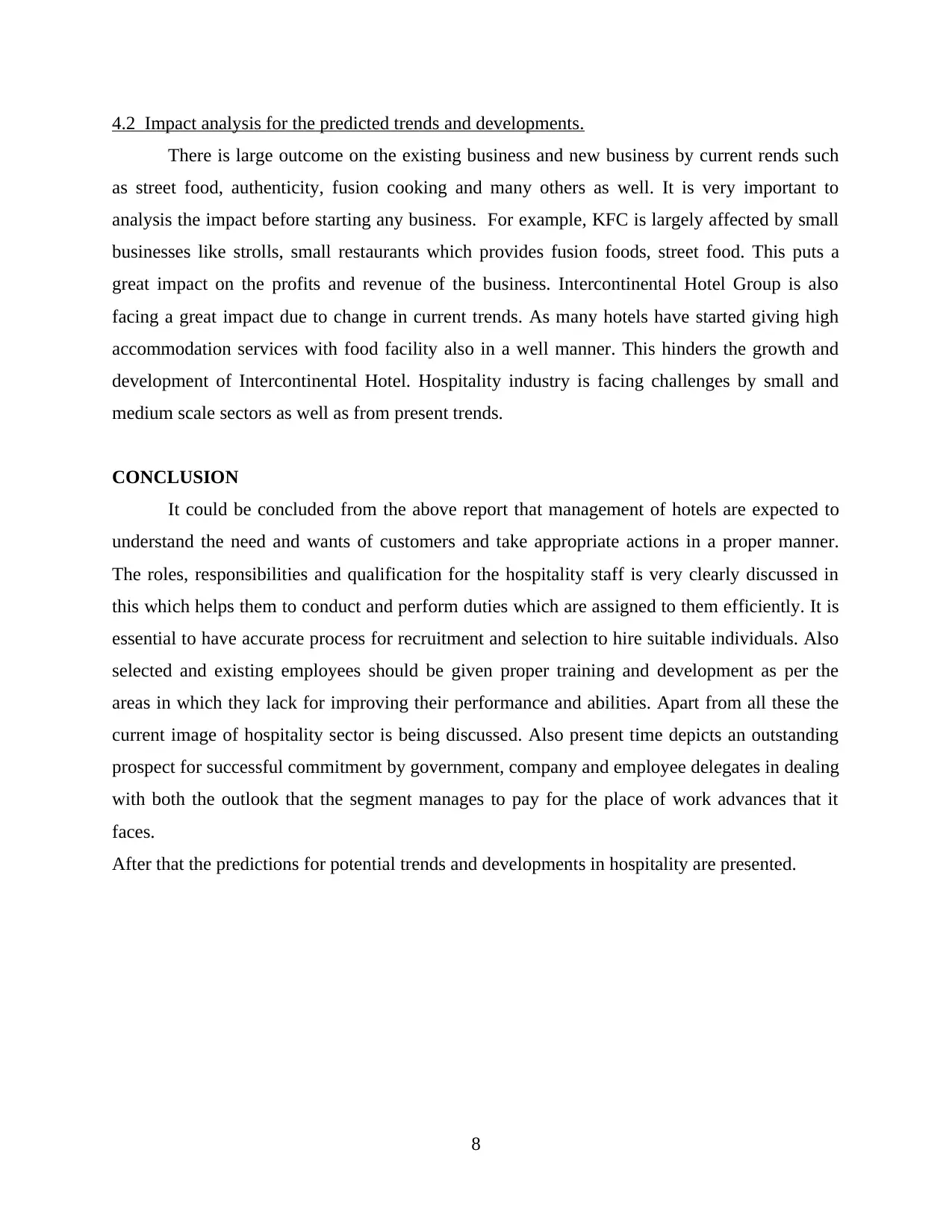
4.2 Impact analysis for the predicted trends and developments.
There is large outcome on the existing business and new business by current rends such
as street food, authenticity, fusion cooking and many others as well. It is very important to
analysis the impact before starting any business. For example, KFC is largely affected by small
businesses like strolls, small restaurants which provides fusion foods, street food. This puts a
great impact on the profits and revenue of the business. Intercontinental Hotel Group is also
facing a great impact due to change in current trends. As many hotels have started giving high
accommodation services with food facility also in a well manner. This hinders the growth and
development of Intercontinental Hotel. Hospitality industry is facing challenges by small and
medium scale sectors as well as from present trends.
CONCLUSION
It could be concluded from the above report that management of hotels are expected to
understand the need and wants of customers and take appropriate actions in a proper manner.
The roles, responsibilities and qualification for the hospitality staff is very clearly discussed in
this which helps them to conduct and perform duties which are assigned to them efficiently. It is
essential to have accurate process for recruitment and selection to hire suitable individuals. Also
selected and existing employees should be given proper training and development as per the
areas in which they lack for improving their performance and abilities. Apart from all these the
current image of hospitality sector is being discussed. Also present time depicts an outstanding
prospect for successful commitment by government, company and employee delegates in dealing
with both the outlook that the segment manages to pay for the place of work advances that it
faces.
After that the predictions for potential trends and developments in hospitality are presented.
8
There is large outcome on the existing business and new business by current rends such
as street food, authenticity, fusion cooking and many others as well. It is very important to
analysis the impact before starting any business. For example, KFC is largely affected by small
businesses like strolls, small restaurants which provides fusion foods, street food. This puts a
great impact on the profits and revenue of the business. Intercontinental Hotel Group is also
facing a great impact due to change in current trends. As many hotels have started giving high
accommodation services with food facility also in a well manner. This hinders the growth and
development of Intercontinental Hotel. Hospitality industry is facing challenges by small and
medium scale sectors as well as from present trends.
CONCLUSION
It could be concluded from the above report that management of hotels are expected to
understand the need and wants of customers and take appropriate actions in a proper manner.
The roles, responsibilities and qualification for the hospitality staff is very clearly discussed in
this which helps them to conduct and perform duties which are assigned to them efficiently. It is
essential to have accurate process for recruitment and selection to hire suitable individuals. Also
selected and existing employees should be given proper training and development as per the
areas in which they lack for improving their performance and abilities. Apart from all these the
current image of hospitality sector is being discussed. Also present time depicts an outstanding
prospect for successful commitment by government, company and employee delegates in dealing
with both the outlook that the segment manages to pay for the place of work advances that it
faces.
After that the predictions for potential trends and developments in hospitality are presented.
8
Paraphrase This Document
Need a fresh take? Get an instant paraphrase of this document with our AI Paraphraser
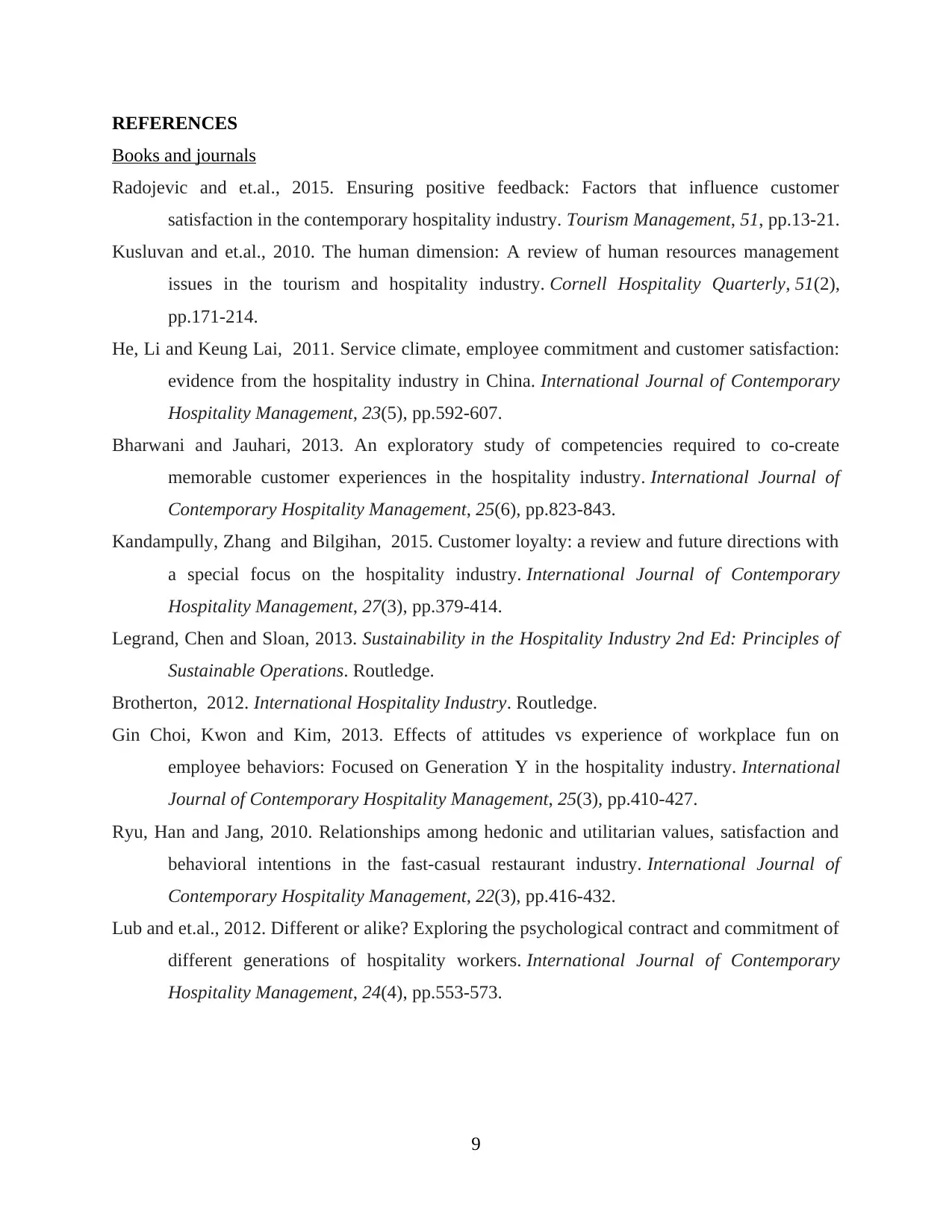
REFERENCES
Books and journals
Radojevic and et.al., 2015. Ensuring positive feedback: Factors that influence customer
satisfaction in the contemporary hospitality industry. Tourism Management, 51, pp.13-21.
Kusluvan and et.al., 2010. The human dimension: A review of human resources management
issues in the tourism and hospitality industry. Cornell Hospitality Quarterly, 51(2),
pp.171-214.
He, Li and Keung Lai, 2011. Service climate, employee commitment and customer satisfaction:
evidence from the hospitality industry in China. International Journal of Contemporary
Hospitality Management, 23(5), pp.592-607.
Bharwani and Jauhari, 2013. An exploratory study of competencies required to co-create
memorable customer experiences in the hospitality industry. International Journal of
Contemporary Hospitality Management, 25(6), pp.823-843.
Kandampully, Zhang and Bilgihan, 2015. Customer loyalty: a review and future directions with
a special focus on the hospitality industry. International Journal of Contemporary
Hospitality Management, 27(3), pp.379-414.
Legrand, Chen and Sloan, 2013. Sustainability in the Hospitality Industry 2nd Ed: Principles of
Sustainable Operations. Routledge.
Brotherton, 2012. International Hospitality Industry. Routledge.
Gin Choi, Kwon and Kim, 2013. Effects of attitudes vs experience of workplace fun on
employee behaviors: Focused on Generation Y in the hospitality industry. International
Journal of Contemporary Hospitality Management, 25(3), pp.410-427.
Ryu, Han and Jang, 2010. Relationships among hedonic and utilitarian values, satisfaction and
behavioral intentions in the fast-casual restaurant industry. International Journal of
Contemporary Hospitality Management, 22(3), pp.416-432.
Lub and et.al., 2012. Different or alike? Exploring the psychological contract and commitment of
different generations of hospitality workers. International Journal of Contemporary
Hospitality Management, 24(4), pp.553-573.
9
Books and journals
Radojevic and et.al., 2015. Ensuring positive feedback: Factors that influence customer
satisfaction in the contemporary hospitality industry. Tourism Management, 51, pp.13-21.
Kusluvan and et.al., 2010. The human dimension: A review of human resources management
issues in the tourism and hospitality industry. Cornell Hospitality Quarterly, 51(2),
pp.171-214.
He, Li and Keung Lai, 2011. Service climate, employee commitment and customer satisfaction:
evidence from the hospitality industry in China. International Journal of Contemporary
Hospitality Management, 23(5), pp.592-607.
Bharwani and Jauhari, 2013. An exploratory study of competencies required to co-create
memorable customer experiences in the hospitality industry. International Journal of
Contemporary Hospitality Management, 25(6), pp.823-843.
Kandampully, Zhang and Bilgihan, 2015. Customer loyalty: a review and future directions with
a special focus on the hospitality industry. International Journal of Contemporary
Hospitality Management, 27(3), pp.379-414.
Legrand, Chen and Sloan, 2013. Sustainability in the Hospitality Industry 2nd Ed: Principles of
Sustainable Operations. Routledge.
Brotherton, 2012. International Hospitality Industry. Routledge.
Gin Choi, Kwon and Kim, 2013. Effects of attitudes vs experience of workplace fun on
employee behaviors: Focused on Generation Y in the hospitality industry. International
Journal of Contemporary Hospitality Management, 25(3), pp.410-427.
Ryu, Han and Jang, 2010. Relationships among hedonic and utilitarian values, satisfaction and
behavioral intentions in the fast-casual restaurant industry. International Journal of
Contemporary Hospitality Management, 22(3), pp.416-432.
Lub and et.al., 2012. Different or alike? Exploring the psychological contract and commitment of
different generations of hospitality workers. International Journal of Contemporary
Hospitality Management, 24(4), pp.553-573.
9

10
⊘ This is a preview!⊘
Do you want full access?
Subscribe today to unlock all pages.

Trusted by 1+ million students worldwide
1 out of 12
Related Documents
Your All-in-One AI-Powered Toolkit for Academic Success.
+13062052269
info@desklib.com
Available 24*7 on WhatsApp / Email
![[object Object]](/_next/static/media/star-bottom.7253800d.svg)
Unlock your academic potential
Copyright © 2020–2026 A2Z Services. All Rights Reserved. Developed and managed by ZUCOL.





